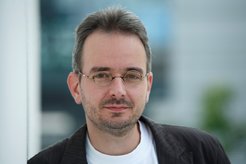2.5 million Euros for innovative plant research
The European Research Council (ERC) awards its “Advanced Grants” exclusively to excellent research leaders in Europe to support particular promising and groundbreaking projects.

Prof. Bock will use the 2.5 million Euros of the ERC to build on previous scientific results of his research group and to develop them further.
The project is divided into three areas, which are based on fundamental insights from its world-leading research on plastids as well as on his work on experimental genome evolution.
Plastids are specialized organelles in plants that possess their own genome, but closely collaborate with the cell nucleus, where the bulk of the genetic information of the cell is located. The plastids represent a diverse group of organelles that includes, for example, the chloroplasts, where the photosynthesis takes place.
The first part of Ralph Bock’s project GenEvoSyn is focused on the analysis and practical application of horizontal gene transfer. Horizontal gene transfer involves the exchange of the genetic material across species boundaries, as it is naturally occurring, for example, during grafting of plants. Only recently, the group of Prof. Bock demonstrated that it is possible to combine the genetic information of the cell nucleus from one plant species with the plastid genome information from another species. Moreover, the combination of the nuclear genomes of two different plant species results in the development of a new species. This type of horizontal genome transfer is now intended to be used to improve existing agricultural crops and to generate novel crop species.
A second part of the ERC project is dedicated to the development of molecular methods to modify the mitochondrial genome of plants. The mitochondria act as the powerhouse of the cell by supplying energy for numerous biochemical reactions. Similar to plastids, they contain their own genetic information. While the plastid DNA can be specifically changed, this is not yet possible in mitochondria. If such methods can be developed, this would be another milestone in biotechnology.
The aim of the third project area is the development of chloroplasts as highly efficient production sites for renewable feedstocks and pharmaceuticals. "This would allow the development of future organic "factories" that offer an environmentally friendly alternative to the production of important chemicals or drugs," Prof. Bock summarizes this third topic of his ERC project.
If horizontal gene transfer can be employed for the generation of plants with novel properties and chloroplasts and mitochondria can be converted into factories for important industrial or pharmaceutical substances, this research would greatly expand the toolbox for modern plant breeding.
